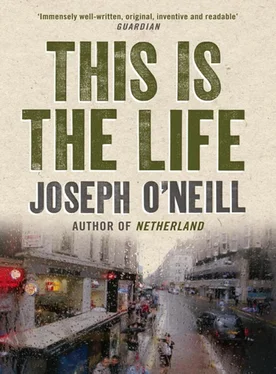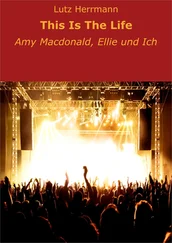We had a beer together in silence. Then I felt obliged to voice a complaint. I said that it was unsatisfactory that I had not been told that Michael would be coming. I told him it had prejudiced our relationship. Michael would now suspect, however wrongly, that inappropriate communications had taken place between us. I wanted to know why this little meeting had been set up, I said.
‘What?’ Then Fergus Donovan caught up with what I had said. Last night, he explained tiredly, he had, for once, got through to his son, and he had asked him to play with us. He couldn’t see anything wrong with that. As for all this stuff about prejudice, he did not know what I was talking about.
I was about to argue my point of view when I saw that Fergus Donovan was distressed about something. He was shaking his head and muttering something to himself. Now I felt ashamed about my niggardly outburst. This was an old man who had travelled a long way to see his son, to lend him a helping hand. Judging by what had happened that day, it looked as though there were communication problems between the two. Donovan, it looked like, was not giving much away to his father. Judging by his early exit after the golf, he was not giving him much of his time, either. And then, of course, there had been the spectacle of his son weeping. No wonder Fergus Donovan was upset.
I offered the old man a beer, but he declined. As we said goodbye he handed me my six pounds’ winnings which Donovan had forgotten to pay. ‘I’ll not have it said that the Donovans don’t pay their debts,’ he said.
I think it is worth mentioning what happened next. I left the golf course wrapped up, enseamed, in thought. I was not dwelling on anything in particular, just giving myself over to deep, unspecific contemplation of the morning’s goings-on. Donovan’s breakdown, if I can call it that, had really unsettled me; and just as out on the course I had had trouble believing my eyes, now I found it difficult to trust my recollection. Had I really seen Donovan cry? Was it possible — Professor Michael Donovan QC? In tears?
My disbelief was fairly understandable. I had never, until that day, seen Donovan show any vulnerability at all — I had never seen him be anything other than himself. This sudden, extreme jump in his identity — from top lawyer to weeping golfer — was too much for me to accept. But accept it I did (I was forced to, I could not very well reject the evidence of my own eyes), and in the car I turned my mind over to a deep analysis of what had happened. It was, I am afraid, a typically fruitless exercise. The memories, theories and figurings all cancelled each other out so that my intense preoccupation came to naught. A cartoonist would have suspended a blank, cloudy bubble over me and linked it to my head with a chain of snowballs.
The caption following after that would show me staring around from behind my steering wheel with a baffled frown on my face and three exclamation marks and a question mark in the thought-bubble: because the next thing I knew I was driving around in side streets, tower blocks everywhere, lost.
I snapped out of my reverie. I had driven in completely the wrong direction: instead of going south, I had gone north. The discovery shook me up. What was going on here? How could such a thing happen? Panicking slightly, I quickly switched in to a thick flow of traffic and came on to a main road. Then I put my foot down. I speeded, I urgently needed to get back, and not long afterwards I was crossing the river over Battersea Bridge, as good as home.
I am afraid that I allowed the afternoon’s goings-on to affect me unduly, because when I finally pulled up in front of my house I came to the conclusion that enough was enough. Sweating, sticky, smelling of my car’s smoky interior, I decided that the time had come to get to the bottom of things. There was a word, a blunt, pocket-sized word, that I could no longer get around: why?
This is not, I should say, a question I often ask myself, certainly not in relation to the behaviour of my fellow men and women. Rarely will you catch me looking into whys and wherefores. As I see it, either you know something or you do not. If a mystery arises, you bide your time, because time, in my experience, clarifies. If the mystery persists, take care of it with a robust presumption. Choose a reasonable analysis and stick to it. Only if, for some reason, the presumption is not enough, should Why? be considered, and then only as a last resort. This approach is, I think, a sound one. Not only is Why? generally an unproductive and inefficient interrogation, but most of the time, you will find, it is positively counterproductive — it actually sets you back. Why? Because once the word makes one appearance it makes thousands more, it proliferates and consumes everything before it: start asking why and you start sliding down a slippery slope, suddenly everywhere you look things cry out for explication, elucidation and unravelment. What I am saying is this: ask why and you ask for trouble.
This is what happened to me on the night of the golf game. Three hours after I had decided to crack the day’s mysteries I was to be found sitting at my desk, a scratch pad in front of me and biro in hand. I was smoking a cigarette and I was nonplussed. The Donovan affair did not add up. I mean this almost literally. I had written down the principal elements of the case and, like a corny sleuth sweating over clues to a murder, I had placed plus signs between them and an equals symbol at the end — an equals symbol that was followed by Donovan cries on golf course? For a long time I sat there regarding the question mark, darkening and thickening it by superimposing it with still more question marks. Why had Donovan cried on the golf course?
My sinuses ached as I racked my brains. No luck. No matter how I figured it, I drew a blank. The equation — Arabella leaves Donovan + Donovan silent in court + Donovan’s journals + Donovan fighting the divorce + me + Arabella’s ansaphone message + Fergus Donovan + Donovan’s new book — led me precisely nowhere, because each element, each addendum, was itself a mystery. Why had Arabella left Donovan? Why had Donovan broken down? Why was I so interested? And so it went on, one why leading to another. It was not that I sought a mathematical solution, because plainly the actions of human beings are never going to work out that way. They are never going to be susceptible to infinitesimal calculus, trigonometry or arithmetic. The answers to the problems are never to be found, like they were at school, by flipping to the back of the text-book. Nevertheless, a certain amount of computation must be involved. Things must eventually tot up; not to the n th decimal point, of course not, but roughly, give or take a few digits. But with Donovan nothing worked out. So many things remained irredeemably and tantalizingly obscure that, rather petulantly, I crumpled up the paper and threw it across the room.
I lit another cigarette and tried to clear my head. I tried to stand back and look at things from a distance, to gain a fresh perspective — maybe that was all that was needed, maybe the case was like one of those trick close-ups of everyday objects: you turn the page upside-down, hold the snapshot away from you and squint, and suddenly the strange, blurred image is transformed into the corner of a Hoover. Maybe everything would suddenly focus into unmistakable familiarity.
I got nowhere. The fact of the matter was that I was no longer involved in the case, I was completely embroiled in it. Whereas in other cases unresolved puzzles were a matter of complete indifference, in Donovan v. Donovan they fretted and nagged at me. Edgily, in a state of excitement, I paced about my room and rubbed my chin. What tormented me was that I knew that, just around the corner, all sorts of answers and discoveries awaited me. Tantalized and impatient, I wanted to fast-forward the action, to skip out the middle bits and get to the end, to the fireworks. It is not that I anticipated the kind of finale you get in adventure movies, with detonations and sizzling cars. But I did know that the answers, when they reached me, would not be run-of-the-mill: I knew that something out of the ordinary was going on, something big. And I could not wait to find out.
Читать дальше
Конец ознакомительного отрывка
Купить книгу












